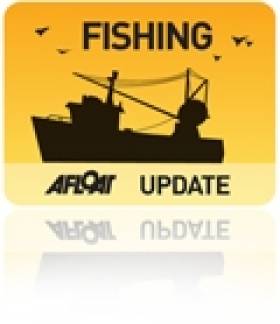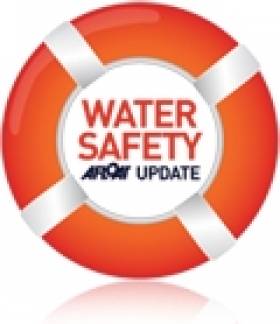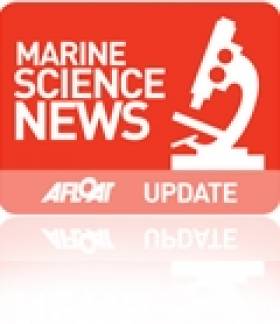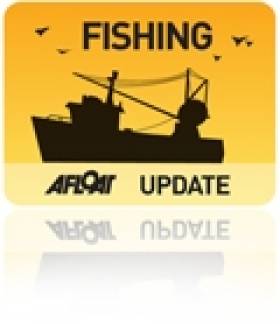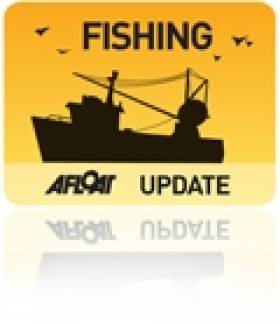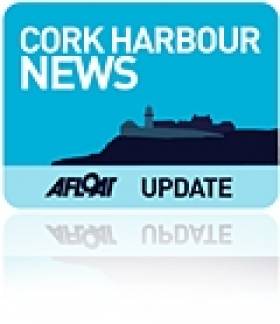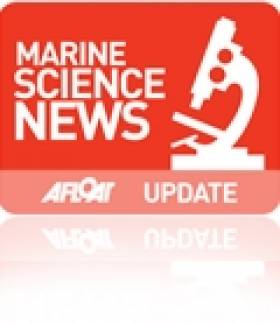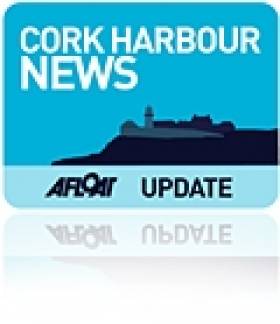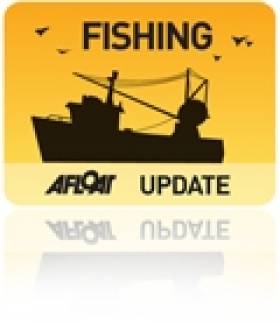Displaying items by tag: Simon Coveney
Bass Fishing Permit Refusal is Welcomed
Environmentalists have welcomed the decision by the Minister for the Marine to refuse a permit for commercial sea bass fishing in the Celtic Sea, The Irish Times reports.
The Friends of the Irish Environment hailed Minister Simon Coveney's retention of the total ban on commercial exploitation of sea bass stocks.
Anglers are only permitted to keep two of such fish measuring more than 40cm in any 24-hour period.
There has been much opposition to the proposal by the Federation of Irish Fishermen to lift the ban on commerical bass fishing.
The species has been on the protected list for more than 20 years but this protection was only made permanent in 2006.
Fatality Rate for Fishermen An 'Absolute Tragedy'
Fishermen and farmers make up more than half of all work-related fatalities in Ireland, according to the Minister for the Marine.
As The Irish Times reports, Simon Coveney TD decried it as an "absolute tragedy" in the Dáil.
He noted the progress being made in encouraging people to wear safety gear when on the water, but said there was "little or no progress in getting fishermen to wear lifejackets”.
"For some reason fishermen seem to think they will never fall in the water," the minister commented.
Cork South West TD Noel Harrington also raised the point of the Department of the Marine's refusal to use personal beacons that directly signal emergency services, rather than emergency position indicating radio beacons (EPIRB).
He referred to the capsizing of the Rambler 100 yacht in the Fastnet Race in August, saying that the latter did not go off to alert the coastguard as the boat had not sunk.
Taoiseach Announces Marine Jobs On Visit of RV Celtic Explorer
An Taoiseach Enda Kenny visited the Marine Institute's research vessel RV Celtic Explorer in Dublin Port today, where he announced the creation of 92 jobs in the marine sector, writes Jehan Ashmore.
"Ireland is now recognised as an emerging power in Marine Research and Innovation," said the Taoiseach. Of the new positions, 64 will be generated in the seafood processing sector. This follows a €3.5m Seafood Processing Business Investment Scheme administered by Bord Iascaigh Mhara (BIM). In the area of marine research, 28 jobs have been created through funding of €2m from an International SmartOcean Graduate Programme.
SmartOcean is a collaboration between IRCSET (Irish Research Council for Science Engineering and Technology), the Marine Institute, five Irish universities and key multinationals and SME Information and Communication Technology (ICT) companies to provide funding for 28 research posts.
The Taoiseach said: "This has been achieved through the mapping of the 90% of Irish national territory that lies under the Atlantic, the creation of a quarter of a billion Euros worth of marine research infrastructure, and the fostering of strong linkages between industry and research centres, all of which will support employment opportunities in key areas of potential growth in the marine sector."
During the tour of the RV Celtic Explorer, the Taoiseach who was accompanied by Minister for Agriculture, Marine and Food, Simon Coveney, welcomed the expansion of Ireland's capabilities in the international shipping services sector, which is expected to attract additional jobs to the country.
Ireland's emerging international shipping services sector has continued to grow, underpinned by a number of investments in new and second hand ships over the last twelve months by such companies as Arklow Shipping and the Mainport Group, as well as foreign direct investments by D'Amico and Ardmore shipping.
As reported on Afloat.ie, RV Celtic Explorer had arrived yesterday into Dublin Port, having completed a fisheries demersal survey which started in Galway on 23 September. Initially she had docked at Ocean Pier but she subsequently shifted berths to Sir John Rogersons Quay for today's reception of An Taoiseach. According to her survey schedule she is due to depart tomorrow on a herring acoustic survey which is to take place in the Celtic Sea and off the south-west coast.
- Dublin Port
- BIM
- Marine Institute
- marine science
- Arklow Shipping Ltd
- Bord Iascaigh Mhara
- Ports and Shipping News
- Ardmore Shipping
- Mainport Group
- D'Amico
- Irish marine jobs
- An Taoiseach Enda Kenny
- SmartOcean
- RV Celtic Explorer
- RV Celtic Voyager
- Sir John Rogersons Quay
- Irish research vessels
- Simon Coveney
Damanaki Promises 'Level Playing Field' in Common Fisheries Policy Review
The European Union's maritime affairs commissioner has promised a "level playing field" during the review of the Common Fisheries Policy (CFP), The Irish Times reports.
As previously reported on Afloat.ie, Maria Damanaki was in Dublin on Thursday to discuss reform of the policy with Irish stakeholders.
She admitted that Ireland had suffered under the current policy, which has led to overfishing in Irish waters by other EU member states such as Spain.
The commissioner said that better maritime planning and protection of "small-scale fisheries" were fundamental to the new CFP.
But she denied that Ireland's situation would worsen under the new proposals, which include concessions on transferable quotas that critics - including Minister for the Marine Simon Coveney - fear would see multinationals buying up Irish fishing rights.
She said similar concessions had worked in Denmark, the US, Australia and New Zealand, adding that the system is designed to compensate those who want to leave fishing without straining the EU's finances.
Damanaki also discussed encouraging the development of offshore aquaculture to combat rising imports of seafood, and her commitment to ending the practice of fish discards - which may also involve a programme to provide lower-income individuals with cheaper fish.
The Irish Times has more on the story HERE.
EU Fisheries Commissioner Visits Ireland to Discuss Policy
EU Commissioner for Maritime Affairs and Fisheries, Maria Damanaki will visit Ireland this week to discuss reform of the Common Fisheries Policy.
Commissioner Damanaki will speak tomorrow at the Institute of International and European Affairs where she will address Irish stakeholders on the new policy, which aims at preserving fish stocks at sustainable levels by managing fisheries in a responsible, science-based way.
She will also later meet with Minister for Agriculture, Fisheries and Food Simon Coveney.
On Friday she will travel to Galway with EU Commissioner for Research, Innovation and Science, Máire Geoghegan-Quinn, to visit the Marine Institute and participate in a roundtable on maritime policy with representatives of the Irish administration and the Irish maritime sector.
Commissioner Damanaki will also gauge the views of Irish stakeholders on the upcoming Atlantic Strategy under the Integrated Maritime Policy, which the European Commission is currently drawing up.
- EU Commissioner for Maritime Affairs and Fisheries
- Maria Damanaki
- Common Fisheries Policy
- Institute of International and European Affairs
- stakeholders
- sustainable fishing
- fishing
- fisheries
- Minister for Agriculture, Fisheries and Food
- Simon Coveney
- EU Commissioner for Research Innovation and Science
- Máire GeogheganQuinn
- Marine Insitute
- maritime policy
- Atlantic Strategy
- Integrated Maritime Policy
- European Commission
Limerick to Host New Boatbuilding Degree Courses
A new scheme to teach traditional boatbuilding skills to university level could be of huge benefit to young people from disadvantaged areas of Limerick.
The Irish Times reports that degree programmes in traditional boat craft accredited by the UK's University of Middlesex are set to take their first students in 2012.
Minister for the Marine Simon Coveney also confirmed that partnerships have been developed with the US Northwest School of Wooden Boat-building and Sail Training International.
Some 40 trainees, mostly from Limerick's designated regeneration areas, have already taken part in the restoration of the ketch Ilen, designed by record-breaking sailor Conor O'Brien.
The AKA Ilen project, set up by boat-builder Gary McMahon, is intended to "nurture self-belief and confidence through the medium of wooden boatbuilding and maritime education".
The Irish Times has more on the story HERE.
Minister Coveney Lends His Support for Cork Harbour Open Day
This is the third year of Cork Harbour Open Day and organisers are hopeful that the wide range of events, such as, concerts on Spike Island, photographic Exhibition in Camden Fort, guided tours of an Irish naval ship and an open day at the National Maritime College of Ireland, will attract many people.
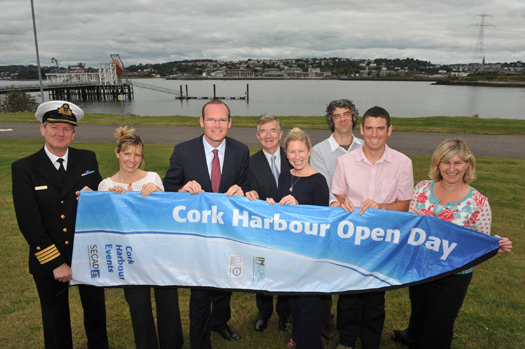
L to R: Captain Hugh Tully Irish Navy, Val Cummins Director of MERC³, Simon Coveney TD Minister for Agriculture, Food and the Marine, Michael Delaney Vice President Development – CIT, Sara Mackeown Commercial Marketing Port of Cork, Cathal O’Mahony Coastal Marine Research Centre, Ken Cotter Cork Harbour Web Designer and Josephine O’Driscoll, Failte Ireland
The idea for a Harbour Open Day emerged three years ago following discussions between various stakeholders involved in the development and implementation of the Integrated Strategy for Cork Harbour. A group comprising of representatives from UCC, City and County Councils, Irish Navy and the Port of Cork set about working together to engage with users of the Harbour and to organise the Open Day.
Cork Harbour is the second largest natural harbour in the world, next to Sydney Harbour, offering beautiful locations for enjoying the outdoors, dramatic coastlines, and excellent leisure facilities, and is home to some very talented artists, sportsmen and women, and people who are passionate about the history, heritage and cultural value of Cork Harbour.
If you would like to be involved in Cork Harbour Open Day or organise an event on the day, please contact Sara Mackeown at [email protected] or 021-4625375.
Minister Coveney And Irish MEPS Now Have Responsibility for Fixing Irish and EU Fisheries
"The Commission's proposal includes solid targets for the recovery of European fish stocks, including requiring that measures be taken in accordance with the best available scientific advice. This could bring an end to overfishing in EU waters and by its fleet internationally," said Uta Bellion, director of the Pew Environment Group's European Marine Programme and OCEAN2012 co-ordinator.
"However, the Commission's proposal falls short in the way it addresses overcapacity, which its own 2009 Green Paper identified as a key driver of overfishing. Instead of mandating a capacity reduction, it aims to decrease the EU fishing fleet by what amounts to the quasi-privatisation of EU fish resources. This type of approach has a mixed track record in other countries and would fail to provide compensation to the public for the loss of communal fishery resources or to reward those who fish in the most environmentally and socially responsible way," Bellion continued.
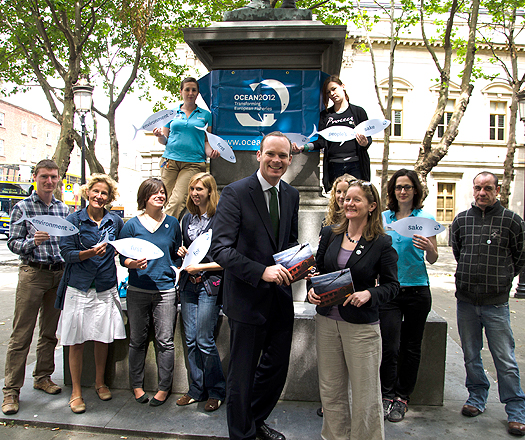
"In the face of concerted short-term economic interest successive Irish fisheries ministers have failed to manage fish resources since the CFP was established more than 30 years ago. Minister Coveney and Irish MEPs must work to end this trend and take the lead in delivering responsible and sustainable fisheries for Ireland and Europe," said Mike Walker, OCEAN2012 co-ordinator. "In the past few weeks Minister Coveney has shown leadership in stressing the need for responsible management of the valuable mackerel fishery, Ireland's marine environment and fisheries dependent coastal communities need him to show the same determination in the reform of the CFP."
1.OCEAN2012 is an alliance of organisations dedicated to transforming European fisheries policy to stop overfishing, end destructive fishing practices and deliver fair and equitable use of healthy fish stocks. OCEAN2012 was initiated, and is coordinated, by the Pew Environment Group, the conservation arm of The Pew Charitable Trusts, a nongovernmental organisation working to end overfishing in the world´s oceans.
The steering group of OCEAN2012 consists of the Coalition for Fair Fisheries Arrangements, Ecologistas en Acción, the Fisheries Secretariat, nef (new economics foundation), the Pew Environment Group and Seas At Risk.
2. OCEAN2012 Ireland members are An Taisce, BirdWatch Ireland, Coastwatch, Dingle Oceanworld, Donegal Island Fishermen, Galway Atlantaquaria, Irish Bass, Irish Kayak Angling Club, the Irish Seal Sanctuary, Irish Wildlife Trust, National Sea Life Centre Bray, Scubadive West, Smart Taxes and Vincent Hyland Learning.
3. OCEAN2012 would like the CFP to:
- Restore and maintain fish stocks above levels capable of producing maximum sustainable yield by 2015, in line with the Johannesburg agreement of 2002.
- Give those who fish in the most environmentally and socially sustainable way preferential access to fish resources.
- End environmentally harmful subsidies and allocate public funds only to activities that contribute to public goods and services.
4. OCEAN2012's vision for reform of the CFP can be found at www.OCEAN2012.eu
Ocean to City, Cork Harbour's annual maritime festival, takes place this year from 3-12 June.
The yearly celebration of Cork’s maritime history and its unique harbour begins on Friday 3 June when members of the public can voyage through the city by kayak, enjoy the thrill of a sea safari trip around Cork Harbour or follow TG4’s Padraig Ó Duinnín as he presents a historical walking tour and talk on rowing in Cork.
The highlight of the festival, An Rás Mór, takes place on Saturday 4 June and will see boats of all sizes row 15 nautical miles from Crosshaven via Cork Harbour, Monkstown and Blackrock before finishing at the boardwalk in Lapps Quay in Cork.
Around 400 Irish and International rowers will compete in a diverse range of vessels including dragon boats, kayaks, currachs, Celtic long boats, Cornish pilot gigs and Irish coastal rowing boats.
Sunday 5 June will see a special 10km kayak race through the city centre. The Irish Naval Service flagship LE Orla will also offer free public tours, while Meitheal Mara will host a guided voyage around the island of Cork by a variety of small craft.
To mark the Cork Harbour School and Heritage Trails Weekend from from 9-11 June, a series of events highlighting the attractions of Cork Harbour, both water and land based, will take place.
Activities include a summer school on the theme of 'recreation in a working port', which will be held in the Port of Cork on Friday 10 June and opened by Minister for the Marine Simon Coveney.
For more details visit www.oceantocity.com.
Coveney Welcomes Seafood Exports Boost
Minister Coveney thanked Bord Bia, who organised the Irish participation, for their successful efforts over the year which saw seafood exports increase in 2010 by 18% to €365m. The Minister said that "Irish Seafood exporters are indigenous businesses with significant scope for expansion who have an important role to play on the road to National economic recovery".
The Minister added that "it is very encouraging that our seafood exports increased by 18% last year. Over 70% of our Seafood exports are sold in EU Markets and hence it is important to see such a strong representation from the Irish Seafood Exporters here at this trade expo, the major annual seafood trade event within Europe. There are more exhibitors this year than in 2010. The Irish seafood sector has exciting potential for further development on the domestic and international markets. If we want to continue towards a high margin export strategy we need to co-operate with each other, continue to differentiate, innovate and develop products based on customer feedback and market research".
On Ireland's international reputation for wholesome, fresh and natural seafood, produced in a sustainable and environmentally friendly manner, the Minister said "this is a key selling point for Irish seafood companies and together with Bord Bia's marketing expertise, and the co-operation and determination of our seafood industry I am confident that we will have a more vibrant and successful sector in the years to come".
The Minister also used the opportunity of his visit to Brussels to meet with the European Commissioner for Research, Innovation and Science, Maire Geoghegan- Quinn. The Minister said "I see the Commissioner as an important ally for Ireland in the Commission and in Europe. I am anxious to develop a strong working relationship with her".
The Commissioner's directorate is responsible for the €142 billion budget of the new Common Strategic Framework 2014-2020 (CSF) Programme, which will combine the funding of a number of current competitive research programmes into a single strategic research vehicle. The Minister went on to say that from an Irish perspective "it is vital that the expertise, previous championing and contribution to the development of research based policy formulation in Europe materialises itself into being successful in the tendering processes in new research programmes. I outlined some of the work of the Marine Institute on the EU front in recent times and the opportunities that it and other Irish research bodies can realise using the expertise and experience built up. I also used the occasion to brief Commissioner Geoghegan-Quinn on the major policy challenges we are facing in agriculture and fisheries, particularly the reforms of the Common Agricultural Policy(CAP) and the Common Fisheries Policy (CFP). The Minister outlined his strong concerns relating to the proposed EU Mercosur Trade Agreement and its impact on the agri food sector in Ireland".


























